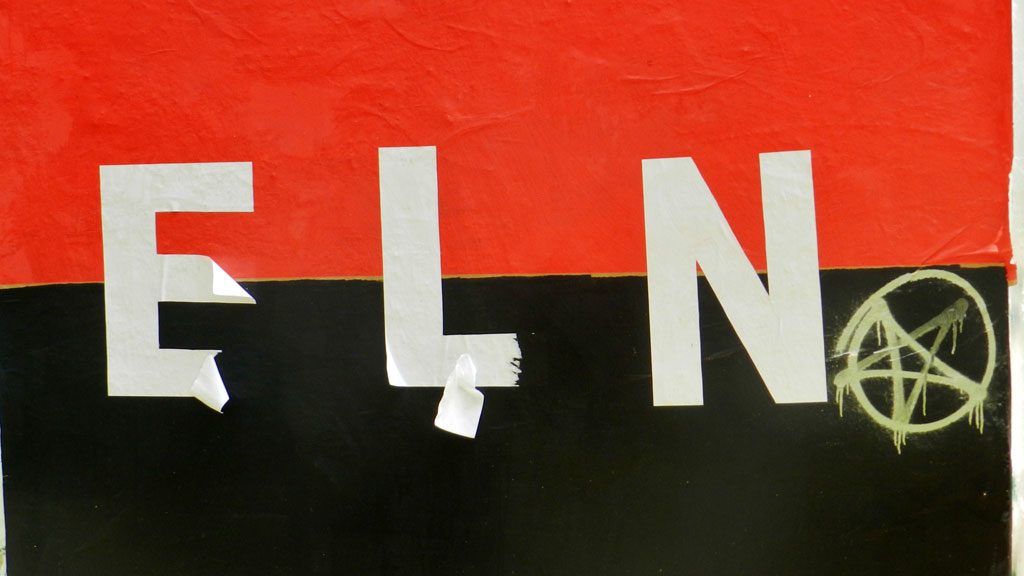With negotiations with the FARC in their definitive stage, the end of the armed conflict also depends on the government and the ELN advancing their exploratory phase to begin a peace process with the country’s second largest guerrilla group.
To achieve a total silencing of guns and a smooth transition to post-conflict, the government is committed to a comprehensible peace process involving two tables of negotiation; one with each rebel group.
With the aim to kick-start this process, the top bosses of Colombia’s two major guerrilla organizations met in Cuba at the end of April, President Juan Manuel Santos announced on Monday.
Fact sheetPeace talksProfilesELNFARC |
ELN boss Nicolas Rodriquez Bautista, a.k.a “Gabino” and top FARC leader “Timochenko” met in Havana last month with the President’s facilitation.
The reunion had the purpose that “Gabino” would personally recognize the advances that the FARC has made in the peace process and decide in the ELN should also enter formal negotiation with the government.
Former ELN leaders’ perspective
Two former leaders of the ELN – who today are conflict analysts – are convinced that the group’s involvement is necessary to achieve a complete situation of peace in Colombia.
Carlos Arturo Velandia a.k.a “Felipe Torres” and Leon Valencia confirmed that April’s meeting between the insurgent leaders included a discussion of the negotiation model so far developed between the FARC and the Santos administration, which has led to partial agreements on topics such as rural reform, political participation and illicit drugs.
Velandia called the meeting between “Timochenko” y “Gabino” an important opportunity to “harmonize the similarities and differences that exist between a peace process that is advancing with agreements… and another that is overdue to begin, because there are issues that require consensus and one sole resolution.”
Required topics of debate at both tables of negotiation with the FARC and the ELN are those related with the de-escalation of the conflict, according to the analyst. These include the achievement of a bilateral ceasefire, demobilization and the transition of guerillas towards political participation, as well as the rights of victims.
According to Velandia, the FARC delegation in Havana “conveyed to “Gabino”” the difficulties of advancing the process without the ELN. One major factor is the agreements on the FARC agenda — concerning the de-escalation of the conflict — that “cannot be realized without the cooperation of the ELN.”
For example, the demining project, which should begin in the regions of Antioquia and Meta in the coming weeks, requires the clearing of territory inhabited by the ELN.
Other issues are the programs to remove coca farms, contained without the third agreement between the FARC and the government about the solution to illicit crops.
The FARC’s concern
The FARC is concerned that the start of a peace process involving the ELN is still yet to begin, according to Director of the Peace and Reconciliation Foundation Leon Valencia.
“The FARC is concerned about the slow pace of the ELN. What “Timochenko” himself wants is to accelerate it, as there are common political interests, such as the Constituent’s Assembly and referendums,” explained Valencia.
“There is joint concern of surviving the transition from guerrillas to political movements, and to not disappear with time like other insurgents,” Valencia added.
Head of the government delegation in Havana Humberto de la Calle defended the legality of the meeting between the two guerrillas in Cuba last month.
“In order to achieve the end of the conflict in a comprehensive manner, the Head of State is convinced that incorporating the ELN in the process is in the best interest of Colombian society,” read his statement on Tuesday.
“The detailed explanation given to the ELN of the progress in Havana is the best way to achieve the final completion of the armed confrontation,” stated de la Calle, adding that “neither alias “Timochenko” or alias “Gabino” participated at the table of conversations.”


